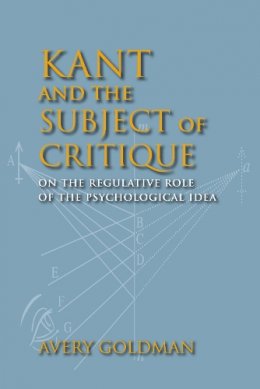
Kant and the Subject of Critique
Avery Goldman
Immanuel Kant is strict about the limits of self-knowledge: our inner sense gives us only appearances, never the reality, of ourselves. Kant may seem to begin his inquiries with an uncritical conception of cognitive limits, but in Kant and the Subject of Critique, Avery Goldman argues that, even for Kant, a reflective act must take place before any judgment occurs. Building on Kant's metaphysics, which uses the soul, the world, and God as regulative principles, Goldman demonstrates how Kant can open doors to reflection, analysis, language, sensibility, and understanding. By establishing a regulative self, Goldman offers a way to bring unity to the subject through Kant's seemingly circular reasoning, allowing for critique and, ultimately, knowledge.
Product Details
About Avery Goldman
Reviews for Kant and the Subject of Critique
Notre Dame Philosophical Reviews
Goldman deserves credit for providing a sustained and resourceful argument that shows the importance of the notion of the subject for comprehending Kant's transcendental method. For this reason, the present volume should interest both Kant scholars and those interested in the German idealist tradition.
Journal of the History of Philosophy
Goldman has written an important book that addresses the metacritical objection to Kant—that in his inquiry into the conditions of knowledge, he makes cognitive and metaphysical claims that exceed the limits of cognition that the first Critique establishes.
The Review of Metaphysics
